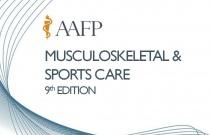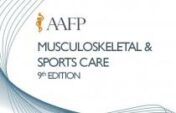AAFP Musculoskeletal and Sports Care 9th Edition 2019
Designed to help family physicians better diagnose and treat musculoskeletal injuries, the AAFP’s Musculoskeletal and Sports Care Self-Study Package is an evidence-based learning solution built to help you boost your ability to evaluate injured bones or soft tissue to determine the stage and severity of injury and increase your repertoire of physical examination techniques including range of motion, bone alignment, and swelling. The package also includes guidance to promote healthy lifestyle for all types of patients, including geriatric and those living with chronic disease all on a schedule that works best for you—in a variety of formats.
This dynamic, 22-session video self-study was recorded from the AAFP Musculoskeletal and Sports Care live course. Use it to better prepare for Sports Medicine module of the ABFM recertification examination as well as the certification/recertification examination for the Certificate of Added Qualifications (CAQ) in Sports Medicine.
Objectives
– Assess injured bones or soft tissue to determine the stage and severity of the injury.
On completion of this course, the learner will be able to assess injured bones or soft tissue to determine the stage and severity of the injury.
– Demonstrate proficiency in examination techniques, including range of motion, stability, bone alignment and assessment of soft tissue swelling/masses.
On completion of this course, the learner will be able to demonstrate proficiency in examination techniques, including range of motion, stability, bone alignment and assessment of soft tissue swelling/masses.
– Prepare treatment recommendations for patients with musculoskeletal injuries that include NSAIDs or pain medication and application of the RICE strategy.
On completion of this course, the learner will be able to prepare treatment recommendations for patients with musculoskeletal injuries that include NSAIDs or pain medication and application of the RICE strategy.
– Counsel patients who participate in organized sports or rigorous athletics on injury avoidance and use of protective gear.
On completion of this course, the learner will be able to counsel patients who participate in organized sports or rigorous athletics on injury avoidance and use of protective gear.
Topics And Speakers:
101-1 – Musculoskeletal _ Sports Medicine 2019
101-2 – Musculoskeletal Imageing A Pic Says It All
101-3 – Chronic Pain, Fibromyalgia, and Opioid Alternatives
101-4 – Complementary Alternative Medicine for Musculoskeletal Conditions
102-1 – Lower Body Disorders Evaluation and Management Hip
102-2 – Cervical Spine Disorders Evaluation and Management
102-3 – Lumbar Spine Disorders Evaluation and Management
102-4 – The Sports Medicine Team
103-1 – Lower Body Disorders Evaluation and Management Ankle
103-2 – Lower Body Disorders Evaluation and Management Chronic Knee
103-3 – Lower Body Disorders Evaluation and Management Foot
103-4 – Upper Body Disorders Evaluation and Management Elbow
104-1 – Injectables Steroids, PRP, Prolotherapy, Stem Cells, Etc
104-2 – Osteoarthritis in the Old and Young
104-3 – Upper Body Disorders Evaluation and Management Chronic Shoulder
104-4 – Medical Clearance for Sports
105-1 – Rheumatoid Arthritis, Gout vs Pseudogout
105-2 – Upper Body Disorders Evaluation and Management Acute Shoulder
105-3 – Lower Body Disorders Evaluation and Management Acute Knee
105-4 – Upper Body Disorders Evaluation and Management Hand and Fingers
106-1 – Concussions
106-2 – Upper Body Disorders Evaluation and Management Wrist
106-3 – Sudden Cardiac Death and Screening
106-4 – Performance Enhancing Supplements


